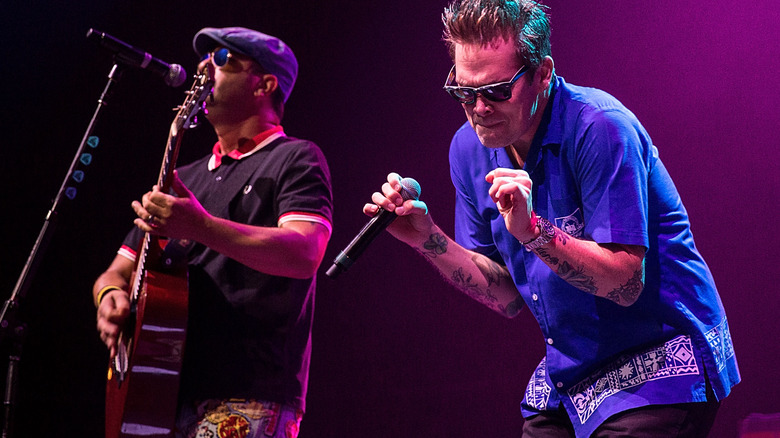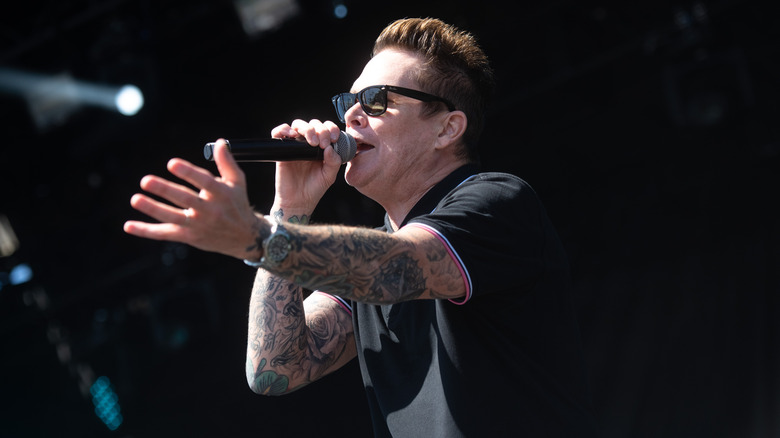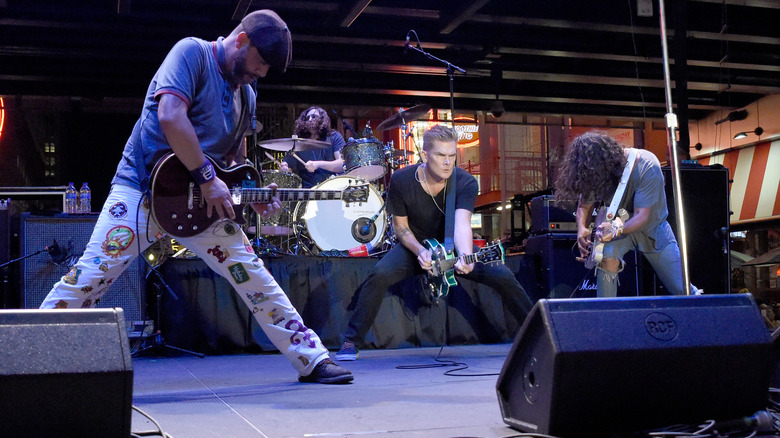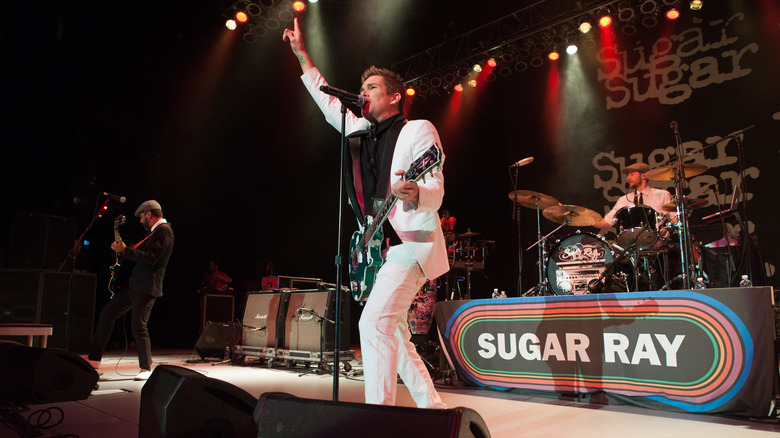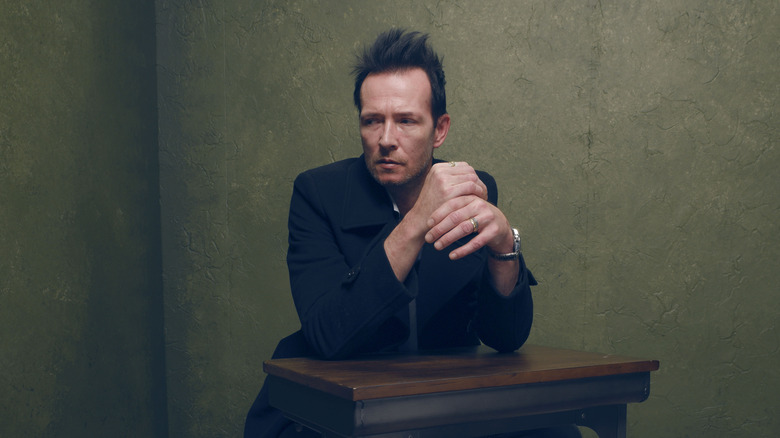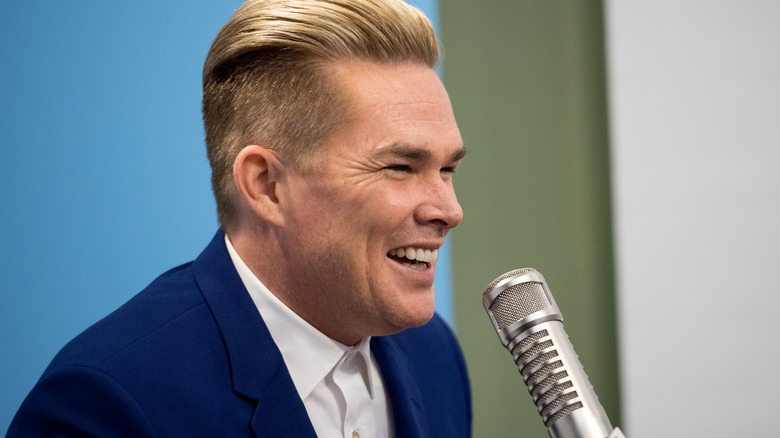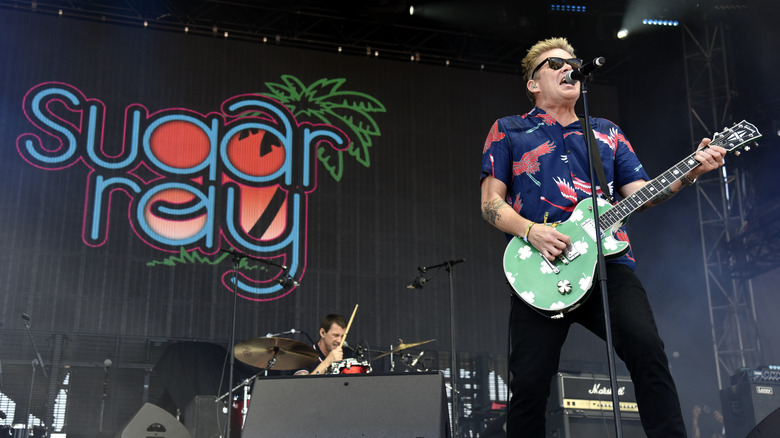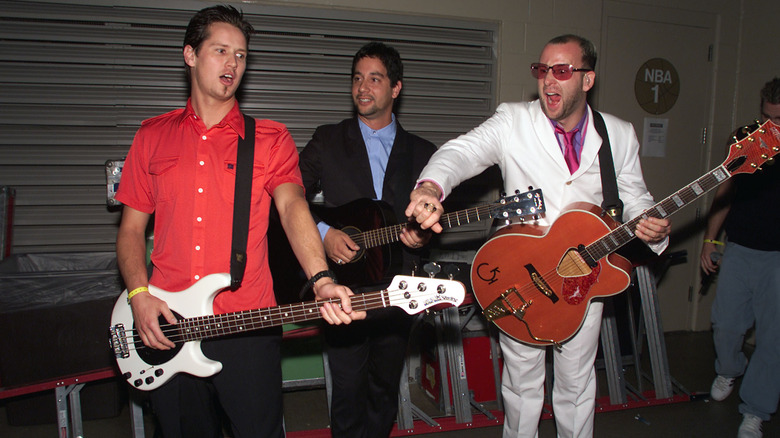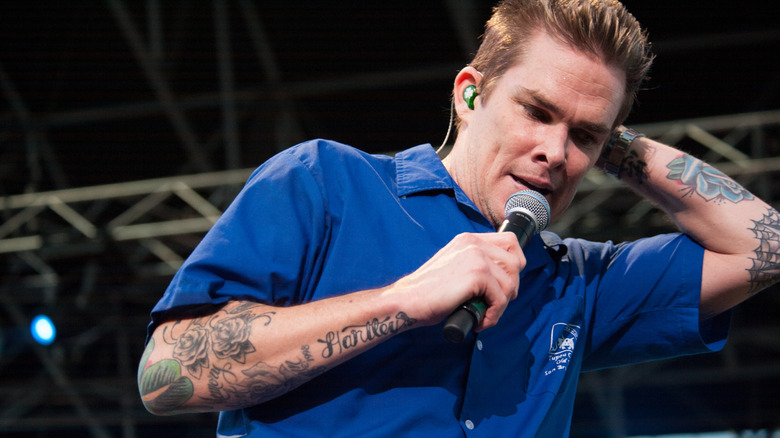Sugar Ray's Tragedies And Hardships
It's a scientific fact (probably) that anyone who was around for the '90s has no choice but to sing along when Sugar Ray's "Fly" starts playing. And "Someday?" That, too.
Sugar Ray was one of the '90s-era juggernauts that shaped the musical landscape of the decade, playing in the background as teens across America drove their parents' car to the record store for the first time, waited in line for tickets to the re-release of "Star Wars," and partied the night away in that off-the-beaten path place that every small town has.
Frontman Mark McGrath spoke with Rolling Stone in 2017 during the "I Love the Nineties Tour," and he got candid about the lasting impact of the decade's music. He described the '90s as the last hurrah of garage bands and ordinary people who could make it big if they had the talent and the guts, and explained the enduring love of the era: "You look back on that ... romantically. 'Boy, that was fun, going to Tower Records to see what's new, watching MTV for a world premiere.' ... It took a while for the stink of the nineties to go away, because nothing replaced it. ... Nothing replaced the nineties, even though the decade was over." It wasn't all fun and games, though, even for a group of guys from California who were determined not to be too serious — even when stardom came knocking.
Some of Sugar Ray's albums have failed
When Sugar Ray released their debut album, it's safe to say that things didn't go smoothly. A one-and-a-half-star review by the Los Angeles Times was par for the course, calling the whole package "infantile... [with] the dumb-fun appeal that's the essence of frat rock." To add insult to injury, they also called Sugar Ray out for giving a shout-out to Mike Tyson with the song "Iron Mic." Tyson had been accused and convicted of rape three years prior to the release of the album, and it just wasn't a great look.
Sugar Ray would be catapulted to superstardom in the late '90s, but like anything else shot from a catapult, they came down hard. Their 2003 album "In the Pursuit of Leisure," sold a measly 135,000 copies, and it was a dismal enough failure that it made frontman Mark McGrath realize he'd better find a backup job — as a TV host. That ended up being fortuitous: The band was dropped by their record label in 2006, and Sugar Ray wouldn't put out another album for three years after that.
By the time "Music for Cougars" was released, McGrath was honest about the fact that they did it because they wanted to and definitely didn't have people beating down their doors. He told Billboard, "We have realistic views of how the music industry is today. I know people aren't sitting on the edge of their seats waiting for a Sugar Ray record. But that wasn't the point. It was purely because we love to make music."
Mark McGrath threatened to quit over Fly
A 1999 article in the Los Angeles Times wasn't kind to Mark McGrath or Sugar Ray, spouting more angry adjectives than actual content. They wholeheartedly condemned the band, starting with onstage behavior they called "impulsively idiotic" and labeling their music "frat-rock inanity." Still, buried in all the hate was an interesting observation that McGrath confirmed: His onstage persona was an act, and one that he hoped would keep anyone from noticing that he had no idea what he was doing. "I used to scream and yell, any kind of antics to get away from my voice," he explained.
When the rest of the band pitched a song they'd been working on — "Fly" — McGrath was so annoyed by it that he initially said that if they were going this way, then he was quitting. But his outrage wasn't necessarily because he hated the music, and after a little enlightenment hit before a Rolling Stone interview, McGrath confessed that he had been dealing with something much more difficult than differing musical tastes.
"We were playing hard stuff, and I said, 'I quit.' But I didn't realize what was happening. These guys were learning how to play better, heaven forbid. And I just wanted to scream and yell because I was scared to be onstage in the first place."
They're aware of the criticism
Every decade has things that look cringey 20 years later, and Mark McGrath told GQ that he's well aware of the fact that he played a big role in making spikey hair with highlights a thing. He also confirmed that in 2019, he was still doing it — only it was covering up gray. Going hand-in-hand with the criticism of their look was the relentless criticism of their music, which McGrath says they all acknowledged.
In fact, their 1999 album, "14:59," was a nod to the claim that they should enjoy their 15 minutes of fame, because that's all they were going to get. Rather than defending their musical prowess, McGrath has been consistently self-deprecating, and explained: "It bothers my bandmates and it bothers other people around me, that I kind of put it down so much, but I just think we got so lucky. But at the end of the day, it's also about results. We did sell 10 million records. We did have two number one songs. We did write four top-10 songs. And I'm very proud of that. You can never take away that accomplishment."
When McGrath sat down with ScreenRant, he described Sugar Ray's ride as one of "medium success," saying that he was content with and proud of what they'd done in spite of the naysayers. "You can call me whatever you want. You can do whatever you want. You can not like the band... but I'm very proud of our accomplishments."
McGrath went viral for the wrong reasons
Going viral isn't always a good thing, and when an expletive-filled video started circulating of Mark McGrath threatening fans outside of a club, it wasn't a great look. The catalyst for the whole thing was a shout of "Sugar Gay!" from the crowd, and everything went off the rails from there. That, in turn, led to accusations of homophobia, but when McGrath sat down to chat with ScreenRant, he explained just what had happened. It was early in the morning, "and I was just drunk enough when someone inserted Sugar Gay, ... I'd just had it."
There was a little more context to the video. McGrath said he had been leaving a bar with a group of friends who happened to be gay. "I was walking outside and there the vitriol and the homophobic statements that were coming out of everybody just shocked me," he said. McGrath clarified that, when he heard shouts coming in his direction, it wasn't the term "Sugar Gay" that set him off — it was the intent behind it. "Because people aren't calling me 'Sugar Gay' in a positive way. You know what I mean?"
In the video, McGrath goes toe-to-toe with a bystander, and he admitted that it wasn't one of his finer moments. "Look, I reacted like a moron, make fun of me for the things I said, but just watch the words sometimes, because words still hurt in this day and age."
On saying goodbye to good friend Scott Weiland
In 2015, CNN reported that according to the Hennepin County Medical Examiner's Office, the official cause of the death of Scott Weiland (pictured) had been revealed as a combination of prolonged excessive drug use, coupled with the presence of alcohol, cocaine, and MDA in his system. Before that announcement was even made, Sugar Ray's Mark McGrath was asked about it on the "Allegedly" podcast (via TMZ).
"He was a friend of mine, and I wasn't shocked," McGrath said. He had seen Weiland just a few weeks before he died, and he described the former Stone Temple Pilots frontman as "a shell of himself." They hung out and had a few drinks, and Weiland even went onstage to perform at the wedding they were attending, but McGrath said that he knew something was very, very wrong.
He went on to explain that he knew exactly what he had seen unfold over the course of his friend's life, and part of it was that "it was the lifestyle and all his heroes did [it] — it was Iggy Pop, or Johnny Thunders. He lived it." McGrath was also heartbreakingly candid about the idea that it was a lifestyle that shouldn't have been emulated: "It's the old cliché, you can't help someone who doesn't want to help himself. Scott was resigned to his belief. His heroes all went through their thing, and I think he was romanced by the whole idea of addiction."
If you or anyone you know needs help with addiction issues, help is available. Visit the Substance Abuse and Mental Health Services Administration website or contact SAMHSA's National Helpline at 1-800-662-HELP (4357).
Sugar Ray saw the dangers of fame first-hand
Hindsight, they say, is 20/20, and in 2021, Sugar Ray frontman Mark McGrath spoke with Page Six about what it was like being one of the '90s-era rock stars who were still performing. That was saying a lot, and not about relevance — it also spoke to the fact that he had survived the decade, when so many of his colleagues hadn't.
"Listen, I was in a rock and roll band and I gave myself a long leash to hang myself. And I went right to the end of that leash." But, he added, he was fortunate enough to be surrounded by a support system that reined him in when things got a little dicey. He was also grateful for the fact that some of the more dangerous pitfalls were temptations that he just didn't have any interest in, citing the heroin addictions that claimed a number of his fellow musicians. "I'm a guy who likes to get up to get down. You know what I'm saying? So I was able to navigate those murky waters."
And Sugar Ray saw a lot of murky waters. When he was talking to the podcast "Allegedly" about the death of his longtime friend Scott Weiland, he acknowledged that the very best job in the world for someone struggling with addiction was to be a rock star. "You can hide it all day long. You can hide it for a long time."
Mark McGrath got real about Sugar Ray's legacy
Even though Sugar Ray was putting out albums in the 2000s, they're known as a '90s band — and Mark McGrath is fine with that. According to what he told ScreenRant, he's realistic about the reaction that any new music was going to have. "Let me tell you something, I don't want to hear your new stuff, either. I don't want to hear Sugar Ray's new stuff. You know what I mean? I want to hear the hits..."
In 2015, McGrath talked to Florida Today about how life outside of Sugar Ray was going. He'd just released a self-financed solo EP, and was grateful that he wasn't focused on making money off of it and could just be happy with the record he'd made. If he'd been hoping to sell copies for a small fortune, he would have been sorely disappointed.
He's also been candid about the strange role that nostalgia plays in the band's continued life, saying that it took a bit to get over the idea that he was performing at the sort of gigs that made them what he called "the county fair element." He told MassLive: "I think music is the only profession where we look at nostalgia as, for some reason, maybe something that's sad, or 'less than.' If you look at athletes for what they've done, we look at them positively. ... Once you stop trying to fight the nostalgia, it's a pretty good ride."
They've weathered changes in the music industry
Sugar Ray appeared at something of a sweet spot in the music industry, and frontman Mark McGrath has been candid about how things have changed — and not necessarily for the better.
McGrath was the host of "Dark Side of the '90s," and spoke with Showbiz about how it was Nirvana that broke down a barrier that allowed for a whole new wave of groups — including Sugar Ray. "Nirvana, those bands opening the door led to alternative music which became a whole variety of different things... We found our own lane, but grunge definitely helped us get signed. I'd be lying if I said differently."
But nothing lasts forever, and McGrath has also openly lamented the way the industry has gone since the '90s. In fact, he says it's added to the '90s nostalgia that groups like Sugar Ray have credited for their enduring popularity. He told Florida Today that he regrets the instant, on-demand music and the lack of a connection between people and songs. "People used to go buy a record because they wanted something tangible ... Now, they download a song off the internet and might forget they had it until they are going down the street and have their device on shuffle and the song comes on. I miss the tangible side of the business, and it's a real art that seems gone."
Sugar Ray imploded with a massive lawsuit
Yes, Sugar Ray is alive and well more than two decades after they initially hit the airwaves. They're still touring and releasing music, although the lineup has changed. Were those changes voluntary? That was up for debate in a 2013 lawsuit.
That, reports Courthouse News Service, is when Sugar Ray's former drummer, Stan Frazier (right), and former bassist, Murphy Karges (left), sued frontman Mark McGrath and guitarist Rodney Sheppard (center). The court documents made it pretty clear that it was mostly McGrath they had a problem with, and their complaints started with claims that they never actually quit the band — they were pushed out, they said. They also claimed Sugar Ray's licensing agreements were renegotiated without them.
Their list of grievances was long, and among them were claims that McGrath demanded $10,000 per appearance and first-class plane tickets (while everyone else flew economy), and that he formed a shell company to increase his own profits. On top of it all, the former members took issue with McGrath's social media posts, claiming he'd repeatedly made posts insulting them and their contributions, while lauding Sugar Ray as a "world class band" after their departure. It's unclear just what came of the lawsuit, but Sugar Ray continued without Frazier and Karges.
Mark McGrath has been candid about hearing loss
Sugar Ray frontman Mark McGrath has made it clear that performing in front of audiences who saw them live the first time around — or bought their albums — is the band's bread and butter. But in 2019, he spoke with the Daily Mail and got candid about the fact that he didn't know how much longer he was going to be able to keep performing. After asking the interviewer to repeat a question, he explained, "I'm deaf now. I cannot hear anymore. It's been years and years of being on the road and being two feet in front of cymbals and drums. So high frequencies, I can't hear anymore. ... It's scary, because my job is hearing."
Ear protection, he acknowledges, has come a long way since Sugar Ray's heyday, but he also acknowledges that he still drags his feet when it comes to adapting to using them. Decades of performing without them have made it hard to transition, but he says he's well aware of the fact that he's going to need to do precisely that if he wants to keep his hearing.
"You can't repair your hearing. Once it goes, it goes. You can hope to stop the damage. It's absolutely a worry of mine." McGrath also noted that he wasn't immune to other age-related health issues, either, citing problems with his knees and back before lamenting there was no escaping the drudgery of real life... even for a rock star.
